|
|
|
Sort Order |
|
|
|
Items / Page
|
|
|
|
|
|
|
| Srl | Item |
| 1 |
ID:
154070
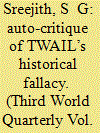

|
|
|
|
|
| Summary/Abstract |
Third World Approaches to International Law (TWAIL) has been impactful in international law scholarship. However, many of its epistemic approaches, especially its active historicising, have often turned counterproductive to its objective of securing freedom for the peoples of the Third World. Moreover, pursuing the colonial past through weighty polemics has rendered TWAIL a discourse that engenders anti-Western sentiments. Further, TWAIL’s dialectic means of resistance and opposition to a past-influenced present ingrained in international law and systems, which are at the disposal of the West, have the reverse effect of dialectically imposing a Western otherness on TWAIL. Hence, an alternative manifesto is sketched, which, while it disagrees with the exclusion of the West in social production, refuses to privilege the West through a Hegelian dialectic of otherness. The alternative manifesto proposes an alternative dialectic wherein the otherness is a ‘universal’ in the self-consciousness of the subjects. It is a dialectic of inclusion and open participation. The article also attempts to situate the new dialectic in international law.
|
|
|
|
|
|
|
|
|
|
|
|
|
|
|
|
| 2 |
ID:
154079


|
|
|
|
|
| Summary/Abstract |
This paper looks at the ways in which culturalist discourses have influenced our understanding and representation of the rise of the so-called Islamic State. It argues that, in keeping with older narratives on the motives of ‘bad’ Muslims, its political and economic objectives have been overlooked and/or downplayed. Instead, I propose, there has been a strategically efficacious focus on its appeal to Islam, on its sectarian rhetoric and on its use of violence. By continuing to emphasise the ethical over the political in these ways, the culturalism that underpins the dominant representation of the Islamic State’s emergence has, I conclude, served three key purposes – the mobilisation of the ‘good’ Muslim, the exculpation of Western foreign policy and the legitimisation of force.
|
|
|
|
|
|
|
|
|
|
|
|
|
|
|
|
| 3 |
ID:
154078
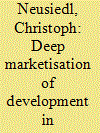

|
|
|
|
|
| Summary/Abstract |
This article introduces the concept of ‘deep marketisation’ as a relatively new, contemporary phase of neoliberal development policy in Bangladesh. By looking into the development strategy of the country’s energy sector, the article shows how an emphasis on marketisation through public-private partnerships (PPPs) and other strategies advances a market fundamentalist agenda to strengthen the private sector and establish a world market. By drawing on interviews with development practitioners from various development organisations in Bangladesh, the article further reveals how development conceptualisations are shaped by the strategy of deep marketisation, leading to the impoverishment of development by constraining its field of actions to measures based on the primacy of economic growth and private sector-led economic development, at the same time leading to a re-legitimisation of flawed neoliberal development policies that result in further inequality, poverty and environmental degradation.
|
|
|
|
|
|
|
|
|
|
|
|
|
|
|
|
| 4 |
ID:
154068


|
|
|
|
|
| Summary/Abstract |
Fair trade seeks to promote the well-being and empowerment of farmers and workers in the Global South. This article traces the contested growth and configuration of Fairtrade International labour certification, providing a multifaceted and dynamic view of private regulation. I explain why Fairtrade International began certifying large enterprises and how its hired labour strategy has developed over time, illuminating fair trade’s move from peasant to plantation sectors, stakeholder involvement in shaping the growth of Fairtrade labour certification, the internal and external balancing of farmer and worker concerns, and major innovations in Fairtrade’s ‘New Workers Rights Strategy’. My findings challenge the claim that recent market mainstreaming explains the rise of labour certification within fair trade and the more general argument that private regulatory programmes founded to foster empowerment evolve over time to prioritise a logic of control. As I document, Fairtrade International has recently moved to bolster producer power within its organisation and labour rights within its certification programme. My analysis reveals the dynamic nature of private regulatory programmes and the potentially influential role of diverse stakeholders in shaping the priorities of Fairtrade and other labour-standards systems.
|
|
|
|
|
|
|
|
|
|
|
|
|
|
|
|
| 5 |
ID:
154065
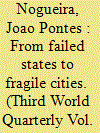

|
|
|
|
|
| Summary/Abstract |
It has become commonplace to claim that cities are becoming conflict zones, or ‘war zones’. This article traces some of the discursive and conceptual shifts that made it possible to define the city as a new frontier for international humanitarian action in states of the Global South. In order to represent cities as humanitarian spaces, concepts of ‘failure’ and ‘fragility’ have been problematised and subjected to reinterpretations that legitimised new strategies applied to the urban realm. I argue that this re-scaling of humanitarian practices enables a de-coupling and inclusion of so called new ‘urban conflicts’ in strategies of global liberal governance. Moving from failed states to fragile cites is a key development to understand changes in the practices that redefine humanitarian spaces today. The definition of urban violence as a new type of conflict informs a new cycle of expansion of the humanitarian order focused on the city. The article analyses the problematisation of concepts of failure and fragility as a decisive move to redefine the boundaries of humanitarian spaces.
|
|
|
|
|
|
|
|
|
|
|
|
|
|
|
|
| 6 |
ID:
154067
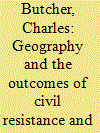

|
|
|
|
|
| Summary/Abstract |
This paper reports the results of the first cross-national examination of the impact of the geography of nonviolent contention on regime transitions. Nonviolent tactics ‘work’ in part by signalling the preferences of non-participants through the symbolism of participants, unlike violent tactics. This opens the way for nonviolent campaigns to exploit variations in social-spatial meaning to enhance the informativeness of dissent. Capital cities are one such symbolic place and the main prediction of this study is a positive relationship between large protests and regime transitions in the capital, but not elsewhere. I also predict a strong direct relationship between the proximity to the capital of fighting in civil wars, and regime transitions; no relationship to the proximity of nonviolent contention; and that the intensity of violent conflict impacts regime transitions in a way that is largely independent of location. Results from an analysis of episodes of violent and nonviolent conflict from 1990 to 2014 generally support these contentions.
|
|
|
|
|
|
|
|
|
|
|
|
|
|
|
|
| 7 |
ID:
154073
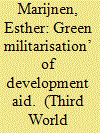

|
|
|
|
|
| Summary/Abstract |
To ‘save’ the Virunga National Park, located in the east of the Democratic Republic of the Congo, the European Commission (EC) allocates development aid to the paramilitary training of the park guards, their salaries, and mixed patrols of the guards together with the Congolese army. Moreover, the ‘development’ projects the EC supports around the park have militarising effects as they are based on a soft counter-insurgency approach to conservation and to address dynamics of violent conflict. This amounts to the ‘green militarisation’ of development aid. This article describes how a personalised network of policymakers within the EC renders militarised conservation-related violence and controversy around the Virunga park invisible, by framing contestations and violence in and around the park as solely caused by economic factors and motivations. Moreover, by ‘hiding’ the fact that the EC aid is used to fund armed conservation practices, policymakers circumvent political debate about the use of development funds for (para)military expenditures. While the existing literature focuses on the importance of securitised discourses to explain the militarisation of conservation, this article indicates that in addition, it is important to focus on these more mundane practices of securitisation within international organisations that ultimately fund the militarisation of conservation.
|
|
|
|
|
|
|
|
|
|
|
|
|
|
|
|
| 8 |
ID:
154069
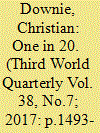

|
|
|
|
|
| Summary/Abstract |
There is a growing consensus that the international system needs to be reformed to reflect the changing distribution of power with the rise of the Brazil, Russia, India and China (BRICs). The Group of Twenty (G20) has been at the centre of these discussions. Within the G20, emphasis has been on great powers or rising powers and their capacity to drive reform. Less attention has been given to the preferences and strategies of middle powers in the G20 and their capacity to shape global governance reform. Drawing on interviews with G20 officials, this paper considers the role of Australia as president of the G20 in 2014. Australia’s presidency presents a unique opportunity to examine the behaviour of a middle power as it balances the competing global governance claims of the USA and the BRICs.
|
|
|
|
|
|
|
|
|
|
|
|
|
|
|
|
| 9 |
ID:
154077


|
|
|
|
|
| Summary/Abstract |
This paper explores how gender ideologies shape industrial relations in the Asian garment industry. Drawing on ethnographic research, it illustrates how widespread norm perceptions of acquiescent women and assertive men reinforce patriarchal, authoritarian unions. Even if privately critical, women may be reluctant to protest if they anticipate social disapproval. Such beliefs reinforce patriarchal unions, curbing women workers’ collective analysis, engagement, and activism. This weakens the collective power of labour to push for better working conditions. Tackling norm perceptions and building more inclusive unions may help strengthen the labour movement.
|
|
|
|
|
|
|
|
|
|
|
|
|
|
|
|
| 10 |
ID:
154074
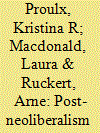

|
|
|
|
|
| Summary/Abstract |
The concept of post-neoliberalism has emerged in response to the electoral victories of new left governments across Latin America starting in the late 1990s. Since then, it has been widely employed to understand the policy response of new left governments to the neoliberal Washington Consensus. However, there is no clear consensus on the utility of the concept and little effort has been made to systematically analyse policy and institutional trends amongst countries pursuing post-neoliberal strategies, including attention to variation in approaches to policy and underlying tensions and contradictions of post-neoliberal policy development. We performed a critical literature review of post-neoliberalism and, based on this review, argue that the concept remains useful, but only if we understand it as a tendency to break with neoliberal policy prescriptions leading to a variety of distinct post-neoliberalisms.
|
|
|
|
|
|
|
|
|
|
|
|
|
|
|
|
| 11 |
ID:
154071
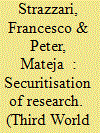

|
|
|
|
|
| Summary/Abstract |
Knowledge on conflict-affected areas is becoming increasingly important for scholarship and policy. This article identifies a recent change in knowledge production regarding 'zones of danger', attributing it not only to the external environment, but also to an on-going process of securitisation of research resulting from institutional and disciplinary practices. Research is increasingly framed by security concerns and is becoming a security concern in itself, although the implications are not readily acknowledged. To illustrate these developments, we draw on fieldwork in Mali and Darfur.
|
|
|
|
|
|
|
|
|
|
|
|
|
|
|
|
| 12 |
ID:
154072
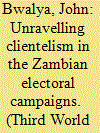

|
|
|
|
|
| Summary/Abstract |
Based on reports on selected parliamentary by-elections from 2009 to 2015 and two presidential elections in 2011 and 2015 in Zambia, this paper examines the political rhetoric to determine the presence and nature of clientelism in Zambian electoral campaigns. Zambia’s three leading newspapers, The Post, Times of Zambia and Zambia Daily Mail, were searched for reports of electoral campaigns. In total, 605 issues of each of the three newspapers spanning a period of 20 months were used. The paper concludes that a blend of vote buying and turnout buying were more evident in the campaign rhetoric in parliamentary by-elections than the presidential elections. Further, the ruling parties extended their clientelistic rhetoric to include perverse accountability.
|
|
|
|
|
|
|
|
|
|
|
|
|
|
|
|
| 13 |
ID:
154075


|
|
|
|
|
| Summary/Abstract |
The notion of vivir bien – a complex set of ideas, worldviews, and knowledge deriving from indigenous movements, activist groups, and scholars of indigeneity – has become an overarching principle for policy-making and state transformation processes in Andean countries. This article analyses the contradiction between the principle of vivir bien as an egalitarian utopian category and its bureaucratic application in Bolivia to state formation processes and power dynamics involving social movements. It argues that while discursively grounded on such egalitarian principles as reciprocity and rotating authority, its implementation entails bureaucratic propensities to centralise power and authority. Instead of decolonising the state, it is used to discipline the masses.
|
|
|
|
|
|
|
|
|
|
|
|
|
|
|
|
|
|
|
|
|